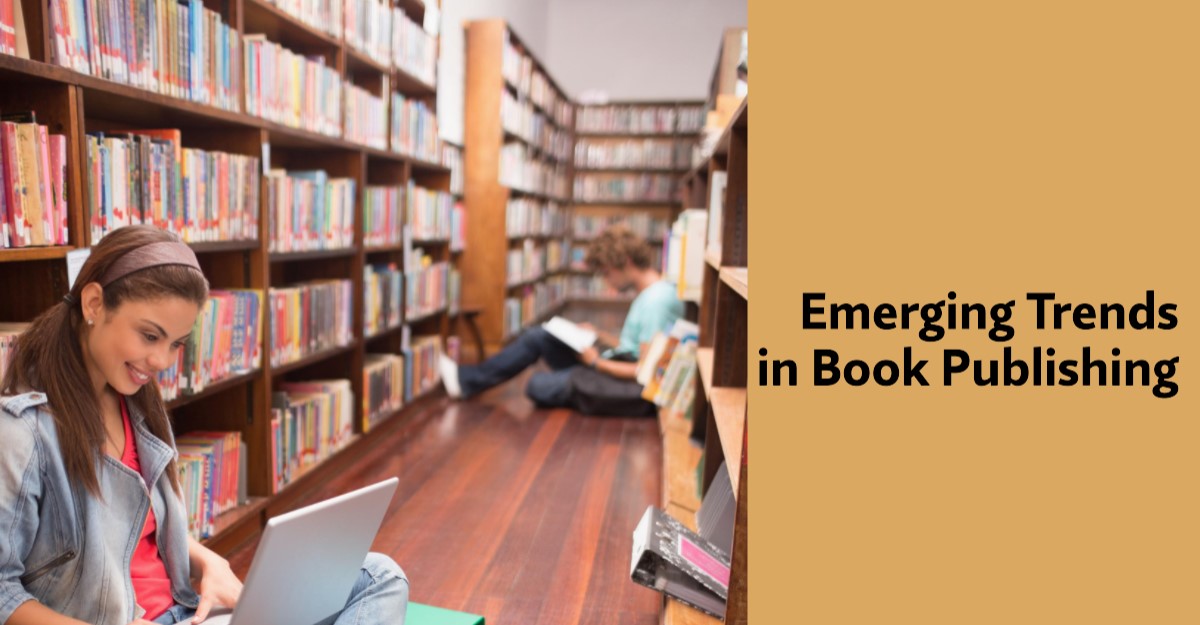In a world driven by technology and innovation, the landscape of book publishing is undergoing a remarkable transformation. Publishing companies are not only adapting to these changes but are also embracing them to unlock new and exciting opportunities. In this article, we will explore the dynamic trends shaping the world of book publishing, from digital transformation to the evolving nature of literary content.
1. Introduction
As traditional publishing methods collide with the digital era, an array of trends are reshaping the way books are produced, distributed, and consumed. Let’s delve into some of the most noteworthy trends driving this revolution.
2. Digital Transformation
The digital revolution has left an indelible mark on the publishing industry. E-books have emerged as a potent force, allowing readers to carry entire libraries in their pockets. Interactive reading platforms further elevate the reading experience, enabling readers to engage with content like never before.
2.1 The Rise of E-books
E-books have disrupted the conventional publishing model. With lower production costs and greater accessibility, authors and publishers alike are embracing this format to reach a global audience instantly. The convenience of e-books has revolutionized the way we read.
2.2 Interactive Reading Platforms
Innovative platforms have breathed life into reading. Features like multimedia integration, interactive quizzes, and social sharing are transforming books into immersive experiences. This interactivity engages readers in a way that traditional print cannot.
3. Niche Genres and Diverse Voices
The diversification of literary genres is empowering authors to explore a myriad of topics. Publishing companies are now better equipped to cater to specific audience segments, fostering inclusivity and representation.
3.1 Catering to Specific Audiences
Niche genres are gaining prominence as readers seek content that resonates with their interests. This shift allows publishing companies to forge stronger connections with readers by providing tailored content that speaks directly to their passions.
3.2 Amplifying Diverse Voices
The literary world is embracing diverse voices and perspectives. Authors from marginalized communities are finding platforms to share their stories, enriching the literary landscape with fresh narratives that reflect the richness of human experiences.
4. Self-Publishing Revolution
Self-publishing has ushered in a new era of author empowerment and accessibility. While it opens doors for aspiring writers, it also presents challenges related to quality control.
4.1 Empowerment and Accessibility
Self-publishing eliminates the barriers to traditional publishing, enabling anyone with a story to become a published author. This democratization of publishing empowers authors to take control of their work and its distribution.
4.2 Challenges and Quality Control
The surge in self-published content raises concerns about quality. With fewer checks in place, ensuring the credibility and authenticity of self-published works becomes a critical challenge for both authors and readers.
5. The Role of Audio Content
The auditory experience is gaining traction in the literary realm. Audiobooks and podcasts are redefining how we engage with stories and ideas.
5.1 Audiobooks and Their Popularity
Audiobooks provide a versatile way to consume literature. They cater to busy lifestyles and allow readers to experience books while multitasking. The growing demand for audiobooks is reshaping the traditional reading experience.
5.2 Podcasts as Literary Platforms
Podcasts have evolved into literary platforms, where authors discuss their works, share insights, and engage with readers. This personalized interaction enhances the connection between creators and their audience.
6. Sustainability and Eco-Friendly Publishing
The publishing industry is embracing eco-friendly practices to minimize its ecological footprint. Print-on-demand technology and green initiatives are leading the way.
6.1 Green Initiatives in Publishing
Publishing companies are adopting sustainable practices, from using recycled paper to reducing carbon emissions in production and distribution. These initiatives reflect a commitment to environmental responsibility.
6.2 Print-on-Demand Technology
Print-on-demand eliminates the need for mass production and excess inventory. This not only reduces waste but also allows publishers to cater to niche markets and minimize financial risks.
7. The Influence of AI
Artificial Intelligence is reshaping how content is created, personalized, and recommended to readers.
7.1 AI-Assisted Content Creation
AI tools are aiding authors in generating ideas, drafting content, and even automating editing processes. While AI enhances efficiency, the human touch remains crucial to crafting authentic and emotive narratives.
7.2 Personalized Reading Recommendations
AI algorithms analyze reading habits to suggest books tailored to individual preferences. This personalized approach enhances the reading experience and introduces readers to titles they might have overlooked.
8. The Blurring Line: Biography vs Autobiography
The distinction between biography vs autobiography is undergoing a creative transformation, allowing authors to experiment with narrative perspectives.
8.1 Exploring Personal Narratives
Writers are adopting innovative approaches to narrating personal stories. The lines between biography and autobiography are blurred as authors incorporate fictional elements to enhance storytelling.
8.2 Fictionalized Biographies
Authors are weaving fictional elements into biographical accounts, adding depth and intrigue to real-life stories. This fusion of fact and fiction challenges conventional literary boundaries.
9. Embracing Change and Shaping the Future
The dynamic landscape of book publishing is a testament to the industry’s resilience and adaptability. As publishing companies continue to navigate emerging trends, they are reshaping the way stories are shared, making literature more accessible and engaging than ever before. The fusion of technology, creativity, and reader preferences is propelling the industry into a future filled with possibilities.
The journey towards innovative storytelling, diverse representation, and sustainable practices is an ongoing one. Embracing change and staying attuned to reader demands will be key factors in shaping the future of book publishing. Through the interplay of traditional craftsmanship and modern advancements, the industry is well-positioned to unlock opportunities that inspire both creators and consumers.
As we embark on this exciting journey, let’s celebrate the evolving landscape of book publishing and the myriad ways it enriches our lives.
10. The Future of Book Publishing
The future promises continued evolution and exciting possibilities. With technological advancements, evolving reading habits, and an emphasis on inclusivity, the world of book publishing is poised for transformative growth.
Conclusion
The book publishing landscape is experiencing a revolution fueled by technology, creativity, and reader demand. As publishing companies navigate this ever-changing terrain, they are unlocking opportunities that redefine the way stories are told and consumed. From digital transformations to the reshaping of genres, the publishing world is a vibrant hub of innovation.
The book publishing world stands at the crossroads of tradition and innovation, where the synergy of these forces is shaping the future of storytelling. From the surge of e-books and interactive platforms to the empowerment of self-publishing authors, each trend contributes to a tapestry that captivates readers and keeps them engaged.
As we look ahead, it’s evident that the convergence of technology, diverse voices, and sustainable practices will continue to redefine the way books are created and consumed. Through this journey of transformation, publishing companies and authors alike are unlocking opportunities that hold the promise of a literary landscape that is more inclusive, engaging, and dynamic than ever before.
FAQs
Q1: How have audiobooks impacted the way we consume literature?
A: Audiobooks have revolutionized the reading experience by offering a hands-free and multitasking-friendly way to enjoy literature. They allow people to listen to books while commuting, exercising, or engaging in other activities, making reading more accessible to those with busy schedules.
Q2: What challenges do self-published authors face in maintaining quality?
A: Self-published authors often face challenges related to quality control and credibility. Without the oversight of a traditional publishing house, ensuring professional editing, design, and proofreading can be difficult. Overcoming these challenges often requires careful investment in professional services and a commitment to producing high-quality work.
Q3: Can AI truly replicate the art of authentic storytelling?
A: While AI can assist with various aspects of content creation, such as generating ideas and drafts, the art of authentic storytelling remains a distinctly human endeavor. The nuances of emotion, creativity, and cultural context that contribute to a compelling narrative are aspects that AI, as of now, struggles to fully replicate.
Q4: What are some examples of successful niche genres in publishing?
A: Niche genres encompass a wide range of topics that cater to specific interests. Examples include urban fantasy, cozy mysteries, dystopian romance, and historical fiction set in specific time periods. These genres allow authors to target passionate readers with unique preferences.
Q5: How can readers support eco-friendly publishing practices?
A: Readers can support eco-friendly publishing practices by opting for digital formats, such as e-books and audiobooks, which reduce paper consumption. Additionally, supporting publishers that use sustainable materials, engage in recycling, and prioritize environmentally conscious printing methods can contribute to eco-friendly efforts in the publishing industry.




